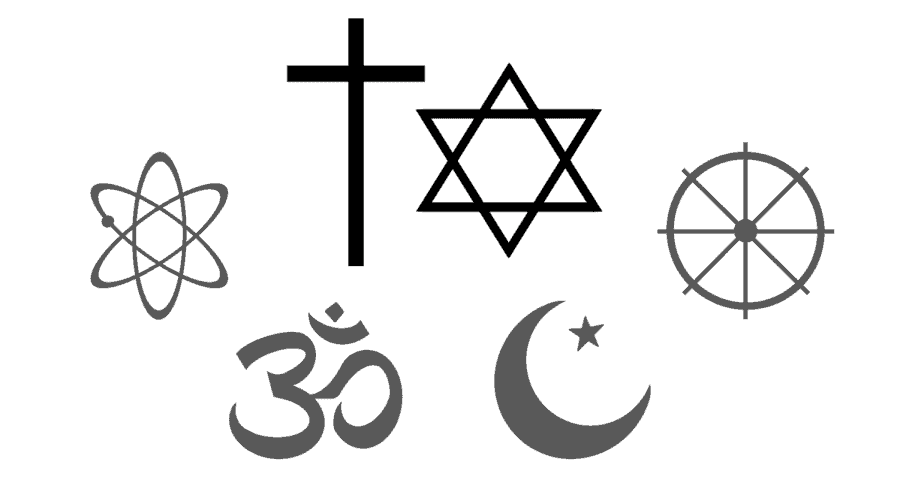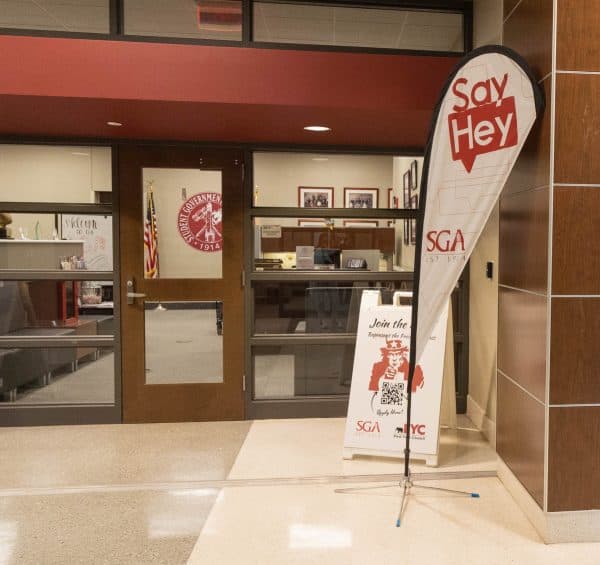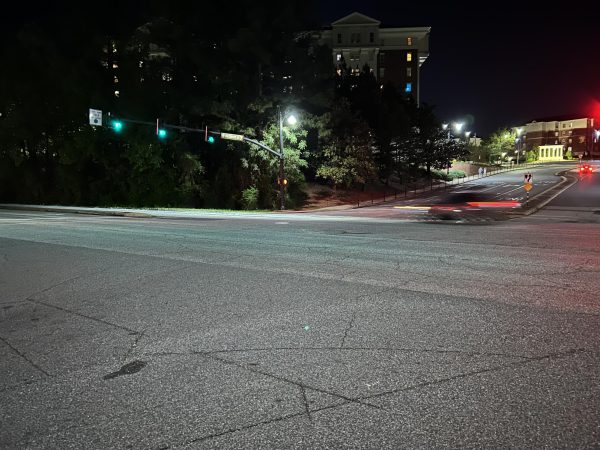SGA “spiritual wellness” day excludes non-Judeo-Christian religions
April 19, 2023
The Student Government Association designated the week of March 25–31 “Wellness Week,” with each day highlighting an aspect of wellness, such as physical, financial or spiritual, through various events.
On Spiritual Wellness Day, March 26, the SGA via Instagram encouraged students to “head to [their] story or the link in [their] bio to access a guide to all of the faith-based organizations on campus.” The list featured only Christian and Jewish groups, excluding several official religious organizations, both Christian and otherwise.
The list of 30 student organizations featured 28 Christian groups and two Jewish groups, the Hillel Foundation and the Chabad Jewish Student Group, and was mentioned in the post as being accessible via a link in the SGA’s Instagram page bio. No other resources or events were provided during Spiritual Wellness Day.
Despite claiming to highlight all faith-based organizations on campus, several Christian SOURCE-registered organizations, such as ONE, a group affiliated with Church of the Highlands, and Christian fraternities and sororities, were excluded from the list.
Two notable non-Judeo-Christian groups, the Pagan and Neo-Pagan Society and the UA Vedic Society, a Hindu group, were also excluded from the SGA’s list, despite the former being registered with The SOURCE. The latter’s registration is currently listed as “frozen,” despite the organization still operating, and as such has an outdated SOURCE web page.
Additionally, the list forwent mention of faiths for which there are no SOURCE-registered groups, such as Islam, meaning no resources were provided during Spiritual Wellness Day for members of these faiths.
According to Britannica, Islam, Hinduism and Buddhism are the second, third, and fourth largest religions worldwide, respectively, altogether having an estimated 3.4 billion followers, but they were excluded from the resources page provided by the SGA in its Instagram bio.
SGA Press Secretary Trinity Hunter said that the groups were excluded from the list because it was taken from The SOURCE’s list of “religious/spiritual” organizations, which does not currently include the Pagan Society and Vedic Society.
Teneshia Arnold, director of student involvement for the University said The SOURCE considers the Pagan and Neo-Pagan Society active and lists it in the student organization directory. The organization’s registration information does not have the “religious/spiritual” designation selected, and as such, the Pagan Society was not part of the list the SGA pulled from The Source.
“The organization can always reach out to Student Involvement to get assistance with making edits to their organization’s page in mySOURCE,” Arnold said. “We would be happy to assist them with getting their page updated with the appropriate categories.”
Ash Williams, a senior majoring in psychology and president of the Pagan and Neo-Pagan Society, said this is not completely true. Williams uses they/them pronouns.
“The Pagan and Neo-Pagan Society is in fact registered as a religious organization as according to what I can see on my end through mySOURCE,” they said, adding that they believe it to be an internal error that is preventing the organization from being displayed under the “spiritual/religious” category on The SOURCE website.
Williams said their organization’s exclusion from the list made them and their efforts to establish the group feel “delegitimized.”
“We put all this work into making space for people who follow the non-traditional path and want to learn more about them, specifically Pagans, Neo-Pagans, Wiccans, because there wasn’t one,” they said.
They said that members individually follow a personal assortment of the “old gods,” such as the Norse, Roman or Greek gods.
“It kind of feels like sand being thrown in our face by SGA,” they said.
Williams said that the Pagan Society often feels unwelcome on campus.
“We don’t table, we don’t do Get On Board Day, we don’t do organization takeover,” they said. “We really try to keep our footprint to a minimum because we’re pagan and this is Alabama. And so we were hoping that maybe SGA would have our backs for this, and they didn’t. That was very much a middle finger at us.”
They said that the specific phrasing of the post was the issue.
In response to their group’s exclusion from this list, Williams commented on the SGA’s initial Instagram post: “you say ‘all’ religious organizations on campus but you forget about @bamapagans and who knows how many else.”
“If they had said, ‘Here’s a sampling of some of the spiritual organizations on campus,’ yeah, sure, I would have been fine. But they specifically phrased it as being ‘all.’ And that felt very delegitimizing to our organization and to our religion,” Williams said.
Similarly, Aditya Upreti, a doctoral physics student and president of the Indian Students Association, said that he believed the SGA’s exclusion of non-Judeo-Christian faiths and atheists/agnostics was “wrong.”
“The SGA is for all students and should provide a platform, especially for voices and opinions, from the followers of Hinduism, Islam, Buddhism, agnostic/atheists, etc., that are in the minority on the University campus,” Upreti said. “This would also help people (especially those from these faiths) feel less alienated from the SGA. The idea of spirituality is not unique to Christianity or Judaism and is deeply engraved in some of the eastern religions such as Buddhism and Hinduism.”
Abhinandhan Narayanan, a doctoral candidate in mechanical engineering and president of the UA Vedic Society, said he didn’t believe it was done purposefully.
“The SGA has been really kind enough to help us do a lot of Hindu events on campus. For example, the Diwali, the majority of the funding came from the SGA’s R.E.S.P.E.C.T. fund,” he said. “And both the SGA and the SOURCE have been really instrumental in us displaying our culture, displaying religion.”
“I think this is just one of those unfortunate incidents where someone didn’t do their due diligence and they just missed to communicate this [spiritual wellness day] with the other groups,” he said.
Narayanan said the SGA did not tell the organization that the Spiritual Wellness Day was happening.
“[The Vedic Society] is a very new organization in the sense that the leadership is new and the principles and the objectives of the organization, we’ve kind of revamped that. And the Wellness Week would have been a wonderful opportunity for us to showcase that, to put our club out there,” he said.
“We are not too disappointed that we were not aware of this because we know that we have their support whenever we need it always,” Narayanan said.
Arnold said the SOURCE currently lists the UA Vedic Society’s registration status as “frozen.”
“This means that the student organization did not complete the organization registration renewal to be considered an active organization on campus,” she said. “Organizations will not appear in the student organization directory when they have frozen status. Once the organization renews their registration, then the group will appear in the directory under the religious/spiritual category.”
Narayanan said his organization is actively working on having this resolved and expects to renew its registration by the end of the semester.
Hunter was asked why on spiritual wellness day the SGA did not offer resources for or discuss religious groups that do not have an official campus presence, such as the Muslim community.
“During the fall, the SGA invited the Latter-Day Saints and other faiths throughout the Tuscaloosa and Birmingham areas to attend a ‘spiritual wellness’ tabling event, including those of Hindu, Muslim, Buddhist and other faiths,” she said. “We did not hear back from anyone except the Latter-Day Saints, who attended said event. Our goal while offering resources was to promote the work done by the Office of Diversity, Equity & Inclusion, not detract from it. Part of this includes providing an updated list of student organizations with a focus in religion/spirituality to supplement the existing one from this department.”
Izzy Boyd, vice president of diversity, equity and inclusion for the SGA, was asked the same question, along with why the SGA chose to go only by the SOURCE’s list, which might not be up-to-date. She declined to comment, deferring to Hunter.
Looking forward, Narayanan said that he would welcome follow-up events or opportunities by the SGA to publicize the Vedic Society, which he said is not well-known. He acknowledged, however, that doing so might not be feasible until next semester.
“It would be appreciated if in the future, SGA provided a platform for students and scholars from minority faiths by including the clubs and organizations represented by them in their discussions,” Upreti said.
“The goal of the Student Government Association is always to serve and uplift students across our campus,” Hunter said. “The purpose of Wellness Week is to advance our peers’ holistic understanding of health and wellbeing through the Alabama Model. With this in mind, we understand that having student input, including constructive criticism, is crucial to improving programs such as Wellness Week. We are committed to listening to student perspectives and continuing our work to become all the more inclusive in future programming.”
When asked what comment she might have for students who felt excluded during Spiritual Wellness Day, Boyd deferred to Hunter.
Similarly, when asked if the SGA planned on adding to their Instagram post resources for major world religions and pagan faiths along with mentioning the list of student religious/spiritual organizations in its bio, Boyd also deferred to her, although Hunter was not asked the latter question.
Narayanan said he had no comment about how he felt about Boyd’s lack of response, but that he believed revising the Instagram post would “go a long way” towards publicizing the excluded spiritual and religious organizations.
Williams, however, was unhappy with Boyd’s lack of response.
“I feel that the way that SGA is handling this is atrocious and that [they] should at the very least be making a public statement to admit their error, though I know that will never happen since most of the organizations that were left out weren’t Christian,” they said.











